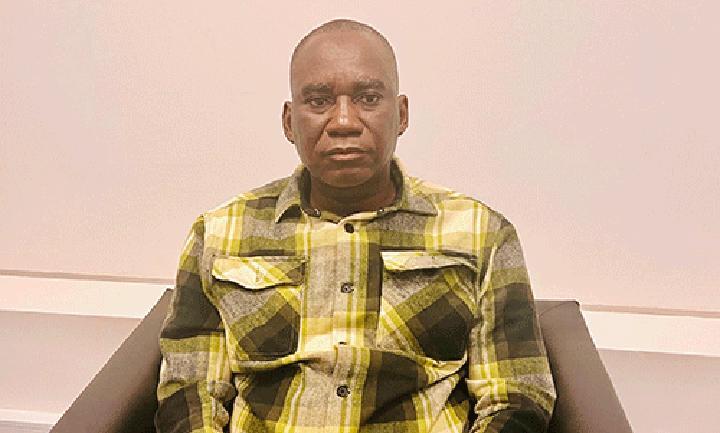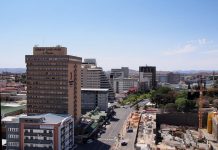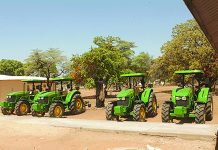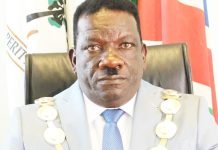Africa-Press – Namibia. In the remote and isolated Tsumkwe constituency, nestled snugly among the thick forests of northeastern Namibia, people live surrounded by nature but also far from help. When someone gets seriously ill here, the struggle is not just against the illness but also against time, poor roads, and, most painfully, the lack of an ambulance.
Tsumkwe Constituency councillor Johannes Hausiku, who has spent the last five years fighting battles few outsiders truly understand, knows the pain too well.
Speaking during a recent interview with New Era as part of the pre-election coverage initiative, he shared a story he says still haunts him.
From food insecurity and water shortages to poor roads and crumbling health infrastructure, his efforts to serve his people have come with a personal cost to his health.
He admits says in 2023, he was diagnosed with high blood pressure, and he is now on high blood pressure treatment.
“I thought this was just a normal office job,” he chuckled. “But your phone rings anytime, even at night. People call you because they are hungry, because there’s no water, no food and no ambulance to take them to hospital. It all gets into you.”
Still, he doesn’t back down. When the rural water supplies to five villages were cut, Hausiku stepped in and got boreholes drilled so people could have free drinking water again.
“These people can’t pay for water,” he said. “They are marginalized. You can’t just close their taps.”
People call him when the water taps run dry. They call when there’s no food. They call when a loved one is dying, and there is no ambulance. They call for almost everything under the sun.
Burden
Tsumkwe’s health challenges are not just about one incident. According to Hausiku, the only ambulance they had was sent away for modifications — but it never returned.
During emergencies, time is everything but in Tsumkwe, sick and injured people are often left waiting for hours — or even days — to get transport to a hospital. The vast distances, poor roads, and lack of vehicles turn every emergency into a dangerous gamble.
“People don’t understand how bad it is until they see it,” Hausiku said. “We have vulnerable people here. Marginalised communities. They deserve the same care as everyone else.”
Hausiku’s health struggles are a reflection of the deep, systemic problems in Tsumkwe — a vast, underdeveloped constituency which is home to more than 15 000 people, many from marginalised San communities.
He recalled the incident that pushed him over the edge; a wounded man who had fallen off a horse in Gam and was impaled by a stick. At the clinic, the staff reportedly told the family to find a private vehicle because there was no ambulance available.
Achievements
Despite the challenges, Hausiku’s time in office has not been without progress. His leadership saw the successful re-gravelling of the Rooidak Gate to Grashoek road — a key route that was previously impassable to tourist vehicles.
“We also brought electricity to Mangeti through a N$40 million rural electrification project,” he noted.
“Before that, school children were eating rotten food because there was no cold storage. Now they have 24-hour electricity.”
He helped establish a leather project in Gam, supported the renovation of the Tsumkwe community hall, and cleared soccer fields to create safe recreation spaces for youth.
But one of his fondest projects is the small garden near the Tsumkwe clinic.
“That garden feeds TB patients,” he said. “They need healthy food for their treatment to work. But the garden is small, so we planned something bigger a 65-hectare garden with fish ponds. Three boreholes have already been drilled, and the fence is up. We’re just waiting for phase two to start.This is not just a food project. This is health. If people eat better, they live better.”
Support from the United Nations Children’s Fund (Unicef) and the World Food Programme has brought the dream closer, but the project still waits for full backing.
Frustration
For Hausiku, the biggest obstacle is the lack of financial autonomy at the constituency level.
“We have good ideas. But regional councillors don’t have their own development budget,” he said. “We depend on the central government and line ministries, and that process is too slow.”
Sometimes it takes months, even years, for a proposal to be approved. In the meantime, communities suffer.
The councillor also raised deep concerns about food distribution in Tsumkwe. Many residents rely on the San feeding programme. But that disqualifies them from receiving drought relief food, due to overlapping aid policies.
“When food aid is given, San people are often left out because ofthe rules say if you get help from one programme, you don’t qualify for another,” he said. “How do you explain that to a hungry person? They don’t understand the criteria. They just see others getting food and they are left with nothing.”
He has appealed to the government to merge the two programmes during drought periods so that no one is left out.
“Let’s not make hunger a technical issue,” he said. “We are too few in this country to let people die of hunger.”
Solutions
Hausiku believes Tsumkwe’s problems need practical, long-term solutions. Chief among them is teaching people to grow their own food.
“We can’t keep feeding people forever,” he said. “Especially in Tsumkwe West, where people are willing to farm. We need to give them tools — tractors, seeds, and training.”
For the eastern part of the constituency, where some San communities still rely on hunting and foraging, he suggests a respectful transition.
“It’s not about killing their culture,” he explained. “It’s about adding to it. Climate change is real — wild fruits and animals won’t always be there. Let’s teach people to have a Plan B.”
Roads
Another constant barrier is Tsumkwe’s terrible roads. Promises have been made, he says, but nothing has materialised.
The councillor knows that a good road is the start of all progress. “Without a proper road, forget about development,” he said bluntly.
Tsumkwe has some of the worst roads in the country, and while promises have been made — many times — nothing has materialised yet.
Hausiku says the government has told him the road is “in the books,” but until construction starts, it’s just another promise.
The role of councillor has transformed Hausiku from an idealistic public servant into a man burdened by the weight of unmet community needs.
“When I entered the office, I was just a normal person with no underlying conditions,” he said. “Now I’m taking pills for high blood pressure.”
Still, he has no regrets — only deep concern that more must be done.
“Tsumkwe is not just a dot on the map,” he said. “It’s home to real people, with real struggles. And as long as I’m in office, I will fight for them — even if it costs me.”
As the country heads toward elections, one clear thing is that Hausiku may be a public official, but in Tsumkwe, he is also a lifeline.
For More News And Analysis About Namibia Follow Africa-Press






